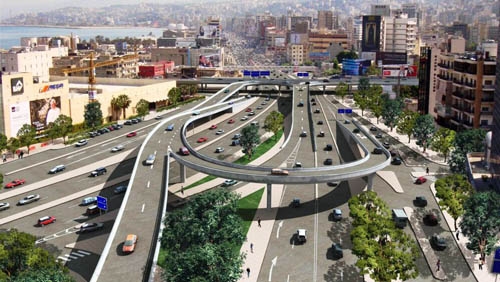The Lebanese Economic Organizations urged the government in a proposal to allow the private sector to be more involved in infrastructure projects in order to ease the financial pressure on the Treasury. The LEO, which groups all the leading banks and companies in Lebanon, said the plan was an attempt to find a solution to the country’s various political, social and economic problems.
The LEO added that the proposal had been put together by a group of think tanks at the request of the organization.
It touched on political reforms, administrative modernization, economic development, private sector enhancement, social advancement, civic awareness and strategic positioning.
The government of Prime Minister Najib Mikati, a prominent businessman himself, also highlighted the importance of the private sector’s role in stimulating the economy as well as allowing the sector to take part in all major projects, such as those to do with electricity and water.
The private sector and Lebanese commercial banks have expressed interest in funding major government projects but have fallen short of calling for the privatization of state-owned assets.
The Private-Public-Partnership slogan has become a common topic in the government’s speeches and statements. However, neither the government nor the Finance Ministry have made significant steps to translate these promises to action.
In the 2012 draft budget, which was presented by Finance Minister Mohammad Safadi, the PPP was repeatedly mentioned, but it did not clearly specify the areas where the private sector could help the government ease pressure on the Treasury.
Many critics and economists have consistently called for a bigger role for the private sector, and some bankers even described the government as a “bad merchant.”
There is a general consensus among many politicians, including those from the March 8 camp, that the Treasury alone cannot fund the electricity and water projects.
Safadi bluntly told ministers that they have one of two choices concerning the projects: either finance the electricity and water projects through new taxes or allow the private sector to take part in the developments.
The government says that if the overspending bill is passed in Parliament in the next session, it will not have a problem in allocating billions of dollars for electricity and water because the funds are available.
However, the government warns that it cannot fund more projects in 2013 and 2014 if the cash runs dry in the Treasury.
The LEO said that they intend to lobby all the decision-makers in Lebanon to underline the importance of implementing broad political and economic reforms as soon as possible.
The LEO added that one of its objectives was to restore confidence in the economy and its future, potentially shielding it from politics.
The group also stressed the importance of appointing civil servants in vacant administrative posts based solely on qualifications.
The proposal will be submitted to the government soon for due consideration, but judging from past experiences it is unlikely that the Cabinet will add this proposal to its agenda anytime soon.
The Daily Star
June 23
























































